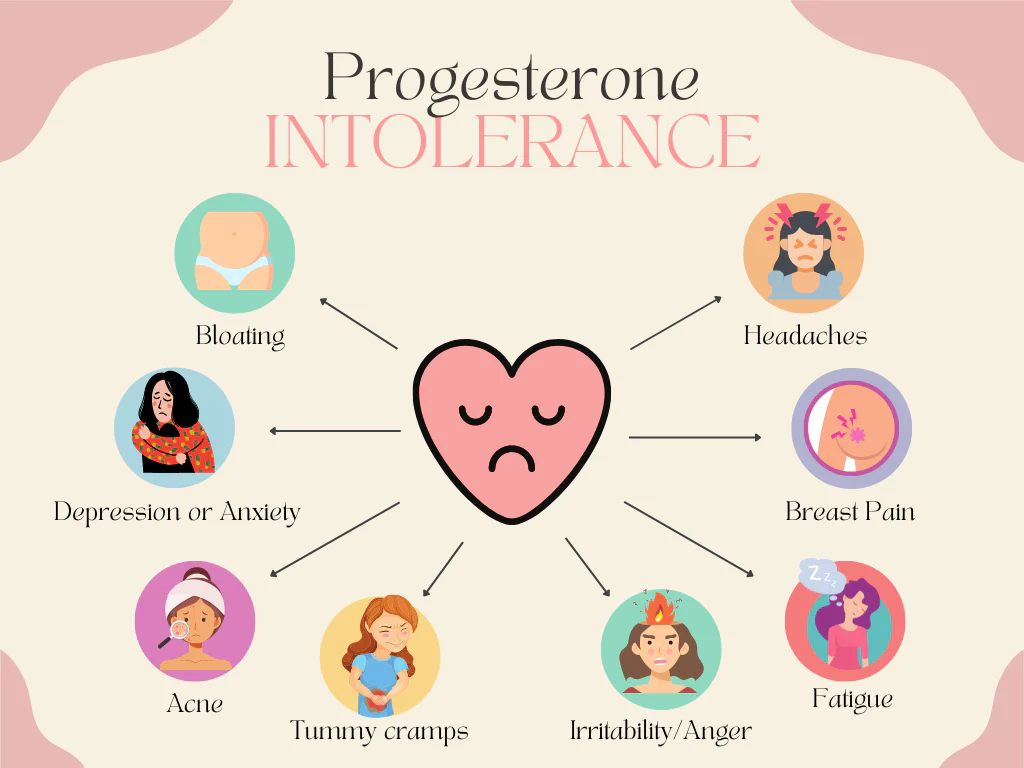Yes – hormone replacement therapy (HRT) can help reduce anxiety in some women by stabilizing hormone levels during perimenopause and menopause, though results vary by individual. Hormone changes often trigger mood swings, brain fog, and sleep disruption that can worsen anxiety.
At SensIQ, Dr. Luke Barr and his clinical team focus on evidence-based solutions, guiding women toward safe treatment options while separating science from wellness hype.
Key Takeaways
- Low progesterone symptoms may include weight gain, vaginal dryness, mood changes, and irregular cycles, and these signs often vary by life stage.
- Progesterone is essential to regulate your menstrual cycle, balance estrogen, and prepare the uterine lining for a fertilized egg.
- Causes of low progesterone include stress, thyroid disorders, poor ovulation, and lifestyle factors such as extreme dieting or overtraining.
- Testing with a blood test during the luteal phase helps confirm hormone levels and guides next steps in care.
- Treatment may involve lifestyle adjustments to support progesterone levels naturally or medical options like hormone replacement therapy, under professional guidance.
What Is Progesterone and Why Does It Matter
Progesterone is a hormone made after ovulation by the corpus luteum. It helps thicken your uterine lining so a fertilized egg can attach. If pregnancy does not happen, progesterone levels drop and your period begins¹.
This hormone also works with estrogen and progesterone to regulate your menstrual cycle. When progesterone production is too low, many women notice changes in energy, mood, and sleep.
How to Tell If Your Progesterone Levels Are Low
Spotting the signs of low progesterone is the first step. Some women have short cycles, spotting before a period, or trouble staying pregnant.
Physical and emotional changes
Common symptoms include bloating, weight gain, breast pain, and vaginal dryness. Emotional changes such as anxiety, low mood, or poor focus are also frequent. When progesterone is low, estrogen dominance may occur, leading to stronger symptoms.
Low Progesterone Symptoms Across Life Stages

Perimenopause
During the luteal phase, hormone changes can cause mood swings, night sweats, or poor sleep.
Menopause
When periods stop, progesterone falls quickly. Symptoms of low progesterone may include dryness, mood shifts, and tiredness.
After menopause
Levels of progesterone stay low for life. Estrogen sometimes continues to rise in comparison, which can add to long-term health issues.
Causes and Risk Factors of Low Progesterone
Low progesterone may happen with stress, poor sleep, thyroid problems, or certain medicines. Extreme diets and heavy exercise may also lower hormone output.
Fertility challenges
Pregnancy needs steady progesterone. If the corpus luteum makes too little, the lining may not hold a pregnancy. This explains why spotting or early loss sometimes occurs when progesterone is too low.
Related Hormonal Issues
Can you ovulate with low progesterone?
Yes, ovulation may still happen. But if levels are too low after ovulation, the lining may not support a pregnancy.
High progesterone symptoms
Too much progesterone can cause breast pain, sleepiness, bloating, and mood shifts. Knowing both the low and high levels helps women communicate effectively with their doctor.
Testing and Diagnosis
A blood test is the best way to check progesterone. Doctors often test during the luteal phase, when progesterone should be highest.
Low Progesterone Treatment Options

How to treat low progesterone naturally
Simple changes may help support progesterone levels naturally. Reducing stress, sleeping well, and eating a balanced diet may help keep hormones stable3.
Some research also suggests that adaptogens, such as ashwagandha, may support stress resilience. In a clinical study, KSM-66 ashwagandha extract was linked with reduced cortisol levels and improved stress response in adults4.
Since chronic stress can impact hormone balance, these findings may be particularly relevant for women seeking safe and natural approaches. Always discuss supplements with a licensed clinician before use.
Medications to increase progesterone levels
Doctors sometimes use hormone replacement therapy or other drugs that increase progesterone levels. These can be effective but may have side effects, so guidance from a specialist, such as Dr. Luke Barr, is important.
Key Takeaways and Next Steps
Low progesterone can affect mood, fertility, and daily life. Knowing the signs and consulting a doctor for testing is the best course of action. At SensIQ, women can find expert support and learn safe, science-based options for care.
References
- Cleveland Clinic. (n.d.). Low progesterone. Cleveland Clinic. https://my.clevelandclinic.org/health/diseases/24613-low-progesterone
- Marion Gluck Clinic. (n.d.). Symptoms of low progesterone. Marion Gluck Clinic.
- National Library of Medicine. (2018). Lifestyle and hormonal health. PubMed Central. https://pubmed.ncbi.nlm.nih.gov/24252493/
- KSM-66 Ashwagandha. (n.d.). Ashwagandha and stress white paper. Ixoreal Biomed. https://ksm66ashwagandhaa.com/wp-content/uploads/2017/01/Ashwagandha_and_Stress_White_Paper.pdf


